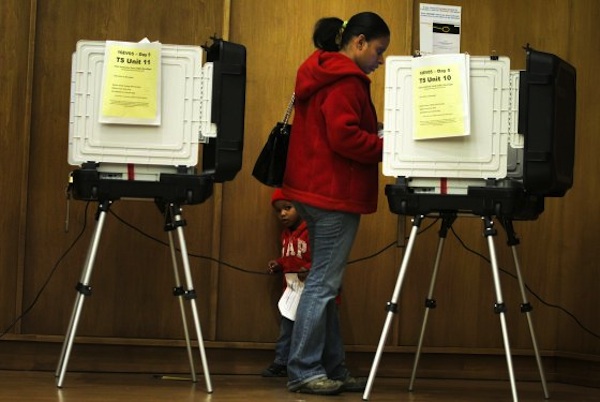A Few Thoughts on the Eve of the Election
U.S. Foreign Policy
by Julia Knight | on November 6th, 2012 |

An early voter (and a future voter) In Maryland on November 2. Source: Getty/Alex Wong
As with many Americans, my attention is divided between the election and the aftermath of Hurricane Sandy. As fellow New Yorkers and others on the Eastern seaboard work to regain electricity, find transportation, resume their daily routines, and in some cases, cope with devastating losses, election officials are trying to ensure that everyone can access their polling places. Though logistical concerns can imperil elections in even the oldest democracies, I’ve been impressed with New York’s and New Jersey’s proactive responses so far. Post-Sandy voting arrangements in some areas appear to be quite unconventional, to say the least, but these are not normal times for many who were in the hurricane’s path. Here’s hoping for a smooth election day across the U.S.
With hours to go, I thought I’d post a couple of foreign policy-related articles and resources:
- In my last blog post, I wrote about the economic consequences of the automation of American jobs, a vital topic that has received relatively little direct attention from the presidential candidates. This weekend, an article by Adam Davidson in the New York Times magazine raises some sobering points about the current effects of automation on the economy, focusing on the plight of the towns and cities that one travels through on the Amtrak ride from New York to DC. As Davidson writes:
The atrophying of the country’s ability to “make real things” has been much lamented, but the truth is that U.S. manufacturing has never been stronger. While there are no universally accepted numbers, the United Nations Statistics Division calculates that the dollar value of goods made in America is at an all-time high of $1.9 trillion, just about even with China. The catch is that the number of American workers needed to create all that value has dropped steadily. In the mid-1940s, more than half of the New Jersey work force was in factories; today around 7 percent do. There are the same number of manufacturing jobs nationwide as there were in 1941, when the country was just more than one-third its current population.
- Speaking of China, the Chinese Television Network (CCTV) is jumping into the election-coverage fray. CCTV’s press release announces that “For the first time, the English language television news channel of China Central Television is offering global viewers continuous coverage of the US Presidential Election results on November 6, 2012,” mentioning that “In view of China’s position as America’s largest economic partner, special coverage will focus on the international financial and economic impact of the election results.” If you’re interested, you can watch CCTV’s take on the election in a variety of ways.
- In the last few hours before the big day, I’ll add that the Foreign Policy Association Election Center has excellent resources and articles on the role of foreign policy in the 2012 election. For me personally, it’s been a pleasure writing about the election for FPA this season and learning from other bloggers’ analysis of foreign policy-related election topics. To those of you voting tomorrow, I’ll repeat once more the parting advice of Bob Schieffer, the moderator of the last presidential debate: “In the words of my mom, ‘Go vote.’ It makes you feel big and strong.”
